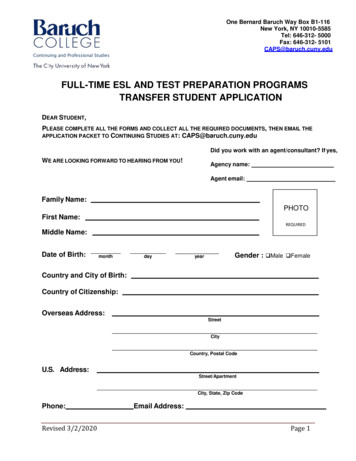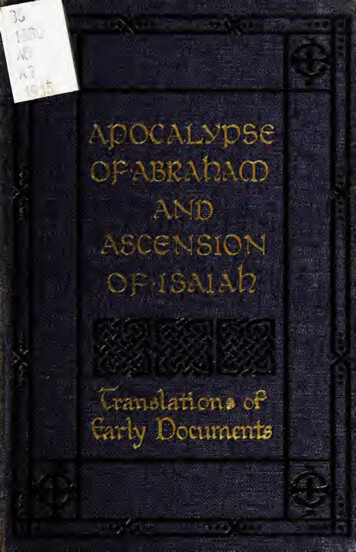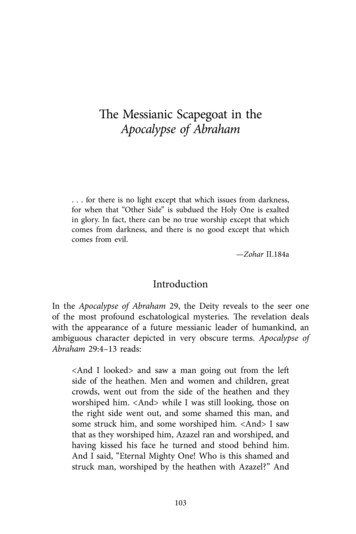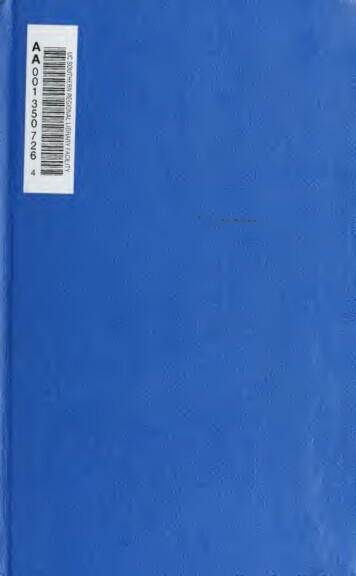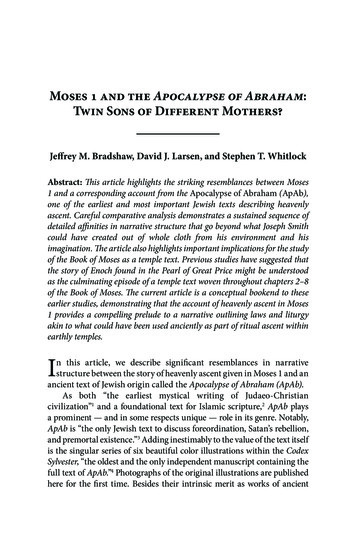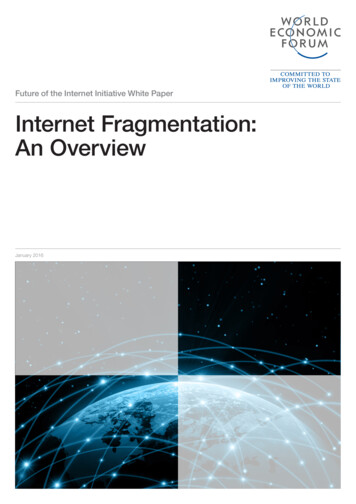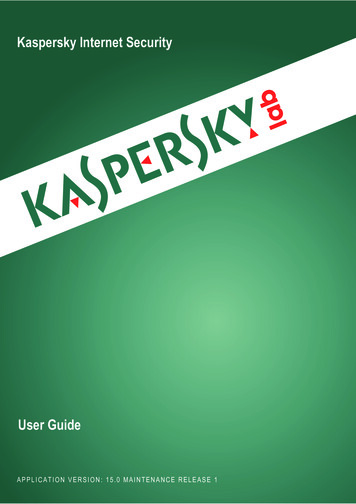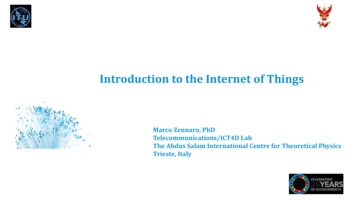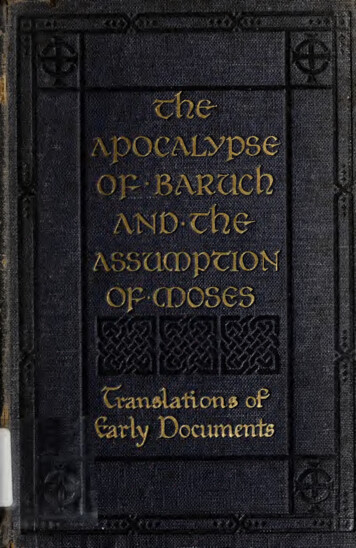
Transcription
-
BS 1773 .C5 1918Bible.The Apocalypse of Baruch
yTRANSLATIONS OF EARLY DOCUMENTSSERIESIPALESTINIAN JEWISH TEXTS(PRE-RABBINIC)THE APOCALYPSE OFBARUCH
THE APOCALYPSEOF BARUCHAPR 261919OGICAL StV 'BY THEREV.CANON /R.H.CHARLES,D.D.WITH AN INTRODUCTION BY THEREV.VV. O.E.OESTERLEY,D.D.SOCIETY FOR PROMOTINGCHRISTIAN KNOWLEDGELONDON:68,HAYMARKET,S.W.i.NEW YORK: THE MACMILLAN COMPANY1918
First Edition igi"]
EDITORS' PREFACEThe object of this series of translations is primarilyto furnish students with short, cheap, and handytext-books, which, it is hoped, will facihtate thestudy of the particular texts in class under comBut it is also hoped that thepetent teachers.volumes will be acceptable to the general readerwho may be interested in the subjects with whichthey deal. It has been thought advisable, as ageneral rule, to restrict the notes and comments toa small compass; more especially as, in most cases,excellent works of a more elaborate character areavailable.Indeed, it is much to be desired thatthese translations may have the effect of inducingreaders to study the larger works.Our principal aim, in a word, is to make somedifficult texts, important for the study of Christianorigins, more generally accessible in faithful andscholarly translations.In most cases these texts are not available in acheap and handy form. In one or two cases textshave been included of books which are availablebut in every such casein the official Apocryphareasons exist for putting forth these texts in a newtranslation, with an Introduction, in this series.desire to express our sincere thanks to CanonCharles and Messrs. A.C. Black for permissionto reprint the text as published in the 1896 editionof The Apocalypse of Baruch, but with the improvements and corrections as contained in the text;We&pubHshed by the Oxford University Press in TheApocrypha and Pseudepigrapha of the Old Testament,vol. ii. pp. 481-526 (1913).W. O. E. Oesterley,G. H. Box.
INTRODUCTIONTitle and Relation to the Book of BaruchThereare several books of Baruch which haveto us; it will be well to enumerate them,as otherwise the number of them is apt to causeconfusion.Our present book is known as the SyriacApocalypse of Baruch ; it is so called because it isonly extant in a Syriac translation. Next, there isthe Book of Baruch in our official Apocrypha on therelationship between these two, see below (pp. viii f.).Then there is the Greek Apocalypse of Baruch, a titlewhich is given to it because its earliest extant formcome down;Greek it exists in only one Greek manuscript.very doubtful whether any connection is to bediscerned between this book and that under con-is;It isFurther, there is the Rest of the Wordsof Baruch, a book entirely independent of our Apocalypsethe same is true of the work known as theGnostic Book of Baruch.' It is different with theLatin Book of Baruch, which, according to Charles," is clearly based on our Apocalypse."And lastly,there is a ' Book of Baruch (quoted in an ancient work, but of this nothing further is known.It may be wondered why there was such a considerable Baruch literature, for we can hardly supposethat the books mentioned represent more than asideration.;1An2Littleabridged Slavonic versionisknownof this;it isalso extant.referred to and utilized inisHippolytus' Philosophumena, v. 24-27 (Charles). See Harnack, Texte und Untersuchungen, Band(1883).i.Heft3
INTRODUCTIONviiiof those written under the pseudonym ofBaruch; but the fact is that, whatever may havebeen the reason, a good deal of legend clustered roundthe name of Baruch in ancient times among theJews, and it was one which evidently enjo ed muchAn example of legend attacliing topopularity.him is the following which is concerned with his" An Arabian king once ordered it to begraveopened but all who touched it fell dead. The kingandthereupon commanded the Jews to open itpart:;;they, after preparing themselves by a three days'Baruch's bodyfast, succeeded without a mishap.was found intact in a marble coffin, and appeared asThe king ordered that it shouldif he had just died.but, after havingbe transported to another placedragged the coffin a little distance, the horses and;camels were unable to moveTheit another inch.king, greatly excited by these wonders, went with hisArrivedretinue to Mohammed to ask his advice.at Mecca, his doubts of the truth of the teachings ofIslam greatly increased, and he and his courtiersThe king then built afinally accepted Judaism.Beth-ha-midrash on the spot from which he hadbeen unable to move Baruch's body; and thisacademy served for a long time as a place of pilgrimage." 3 Many other legends regarding Banichso that,are preserved in ancient Jewish literaturesince he clearly occupied a considerable place inpopular thought at one time, it is not a matter ofsurprise that, in common with other Jewish worthiesof old, he should have had books ascribed to him.A point of some interest, showing a certain connection between our book and the Book of Baruch in theApocrypha, is dealt with by Charles.* In Ixxvii.12, 17, 19 an epistle is referred to which had beenwritten to the exiles in Babylon by Baruch; it is''; Cp. the Enoch, Noah, and2An academy'*Abraham and Mosesof learning.Jewish EncyclopcBdia, ii. 548 b (1902).The Apocalypse of Baruch, pp. Ixv ff. (1896),hterature.
INTRODUCTIONix" an epistle of doctrine and a scroll of good tidings,"which is sent " by means of men." The exiles inBabylon, who belonged to the southern kingdom,represented two and a half tribes, Judah and Benjamin, and half the tribe of Manasseh. This epistleto the two and a half tribes has been lost; butCharles believes that in the Book of Baruch in theApocrypha, i. 1-4, iii. 9-iv. 29, we have a recast ofthis lost epistle, or, at all events, that this passagebased uponisCharlesThereit.isa high probabihty thatright, as the following details willisshow.was addressed to the two and a halfthis is also the casetribes in captivity in Babylonwith the letter of Baruch referred to in Bar. i. 1-4,iii. 9-iv. 29.The lost epistle is described as one of" doctrine and a scroll of good tidings " (Apoc. Bar.,Thelost epistle;this fully corresponds with the writingBar. iii. 9-iv. 29, where, among other things," Learn where is wisdom, wherethese words occurthat thoustrength, where is understanding;is"mayest know also where is length of days, and peace(Bar. iii. 14)see also verses 24-37 for doctrine.Then, as to its being an epistle of good tidings tothose in captivity the following verses clearly show"Be of good cheer, my people, the memorial ofIsrael.Ye were sold to the nations, but not for" For he that."(Bar. iv. 5, 6).destructionbrought these plagues upon you will deliver youfrom the hands of your enemies. . Be of goodcheer, O my children, cry unto God, and he shalldeliver you from the power and hand of the enemies.God will give you to me again with joy andgladness for ever. For like as now they that dwellabout Sion have seen your captivityso shall theysee shortly your salvation from our God, which shallcome upon you with great glory, and brightness of." (Bar. iv. 18-24).And oncethe Everlasting" Be of good cheer, O my children, and crymoreunto Godfor ye shall be remembered of him thatFor hehath brought these things upon you.Ixxvii. 12);in:;:.:.::.
INTRODUCTIONXthat brought these plagues upon you, shall bring youBe ofeverlasting joy again with your salvation.good cheer, O Jerusalem for he that called thee byname will comfort thee " (Bar. iv. 27-30).connection between these two books seems thusThe point, though a smallto be clearly established.one, is not without its interest and importance, asshowing how some of these ancient books can beelucidated one from the other; and also as offeringan example of how an ancient tradition (or, as thecase may be, an ancient document) is utilized by;Adifferent writers.AuthorshipScholars are not agreed as to whether our bookwork of one or more authors.Apart from minor additions and redactional elements,concerning the existence of which there can be notwo opinions, composite authorship is contendedirreconcilable, or atfor on the following groundsleast conflicting, views regarding the Messiah and theMessianic Kingdom; opposing attitudes in respectof various important theological subjects, such asthe nature of the resurrection body, sin, free-will,and works a strong optimism in some parts of thebooks, contrasted with an equally pronouncedpessimism in others and the treatment of the samesubject more than once without any apparent reason,such as a new thought or developed ideas on thesubject previously dealt with. But while thosescholars who contend for composite authorship areagreed upon the general principle, they differ widelywhen they come to details; indeed, as to these, thereis a very small amount of agreement among them.On the other hand, it has been pointed out with muchisto be regarded as the:;; SeeKahisch, Jahrbiicher fiir Protestantische Theologie,1891, pp. 66-107; De Faye, Les Apocalypses Juives, passim,Charles, The Apocalypse of Baruch, pp. liii-lxv(1892);(1896).
INTRODUCTIONxilearning that the conflicting views and opposed standpoints presented in the book do not necessarily compelone to see difference of authorship. Nobody willdeny nowadays that the apocalyptic writers largelyutilized traditional matter in writing their books;but this traditional matter, from its very nature,containing as it did floating material of differentages, must often have presented variety of view oncertain subjects; and the apocalyptists, who incorporated much of this traditional matter in theirwritings, were not concerned to harmonize discrepancies which they found there, for time-honouredtradition was sacred in the eyes of these ancientwriters.So that when we find conflicting views inan apocalyptic work such as that of Baruch, it neednot necessarily imply composite authorship.Prof. Burkitt, who does not see suflicient groundsfor regarding our book as composite, suggests afurther reason why in apocalypses we must be prepared for a certain amount of inconsistency; he" Speaking generally, it may be said that thesaysdivision of Apocalypses into their original conjecturedconstituents is an extremely delicate task, for itassumes that these anticipations, these dreams ofcertain degreethe future, will be self -consistent.The workof consistency we must indeed expect.of the same man will, to a certain extent, alwaysbreathe the same spirit. But his pictures of theMorefuture will not always harmonize in detail.over, I venture to think that we must ahow for thedisturbing influence of real Visions, i. e. pictures seenby the writer in dream or ectasy. There has probablybeen every grade of imaginative writing in this classof Hterature." This is an important consideration,and should be given due weight when the questionof the composite authorship, or otherwise, of anapocalyptic work arises; for it is evident that the:A1(p.2Clemen, in the Theologische Studien und Kritiken, 1898211ff.).Jewish and Christian Apocalypses,p.40f.(1914).
INTRODUCTIONxiiwhoma vision is a divinely sent message,the details of what has come to him inaccordance \\dth his experience, and will not betroubled if this happens not to coincide with somethingthat he has already written.But a further reason against the composite authorship of our book is advanced by Clemens, who hasshown that a number of supposed discrepancies aredue to faulty translation of the Sj riac, and thatmany of them disappear when the text is rightlyunderstood. For details of this recourse must behad to his learned essay. The case for composite authorship is thus shownto be considerably weakened while not denyingthe possibility that our book may have come fromthe hand of more than one author, we do not seethat this is necessarily so.That some isolatedpassages were added later will be generally conceded.seer, towill give;DateAssuming substantial unity of authorship for ourbook we have one or two definite indications as tothe approximate date at which it was writtenwesay approximate, for even on the assumption of;unity of authorship one is not compelled to regard itas having all been written at one and the same time.From xxxii. 2-4 it is clear that Jerusalem has fallenthe book must, therefore, have been written afterthe year a.d. 70, though there is no reason whysome portions of it should not belong to a slightlyearlier period.On the other hand, it is improbablethat it was written much later than a.d. 100 onaccount of its affinity \\ith ii. (iv.) Ezra; both books;1Referred to in noteiUnity of authorshiponp. xi.contended for by Ryssel, inKautzsch's Die Syrische B ayuchapokalypse in " Die Apokryphen und Pseudipigraphen des A.T.," ii. p. 409 (1900);Ginzberg, in the Jewish EywyclopcBdia, ii. 555 a (1902);Schiirer, Geschichte des jiidischen Volkes, iii. p. 312 (1909),*is,
;.INTRODUCTIONxiiibelong to the same period. For the date ofEzra see Box's edition in this Series, p. vii.ii.(iv.)LanguageAs already mentioned, the only extant form of thisapocalypse is in Syriacthis version is, however, atranslation from the Greek, which is proved by theSyriac rendering of many words and passages, as wellas by " certain corruptions in the text which areexplicable only on the hypothesis that the translatormisinterpreted the Greek, or else found the corruptionalready existing there." If further proof were required it would be foundin the fact that in the one Syriac manuscript whichcontains the whole text the superscription runs" The writing of the Apocalypse of Baruch, the sonof Neriah, translated from Greek into Syriac."ThisGreek form has almost entirely disappeared; onlytwo passages are extant, viz. xii. i-xiii. 2 and xiii.2-xiv. 2; these were discovered by Grenfell andHunt, and pubhshed by them in vol. iii. of theOxyrhynchus Papyri, pp. 3-7 (1903). But neitheris the Greek form the original one.The thoroughlyJewish character of the whole
theapocalypse ofbaruch apr261919 ogicalstv ' bythe rev.canonr.h.charles,d.d. withanintroductionbythe rev.vv.o.e.oesterley,d.d. societyforpromoting christianknowledge .
